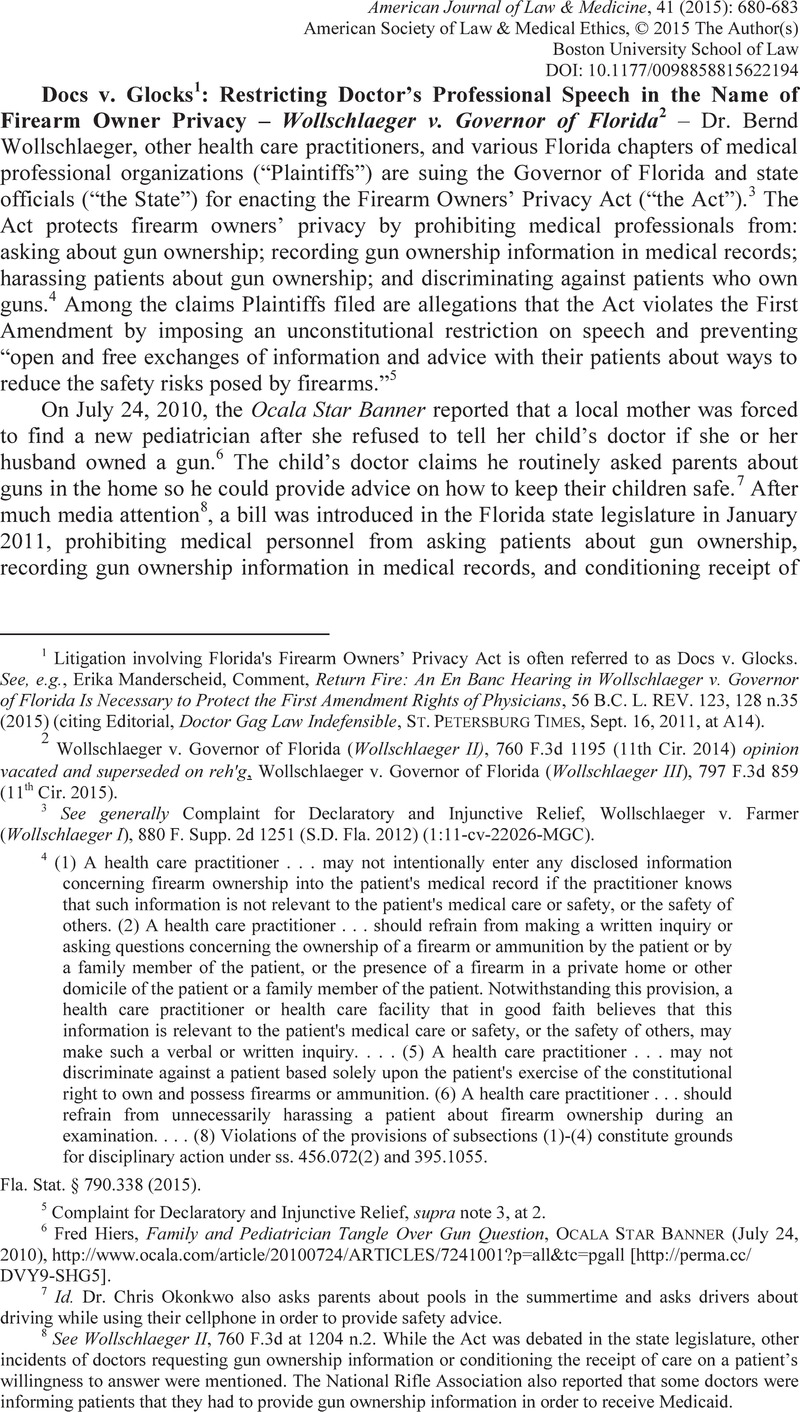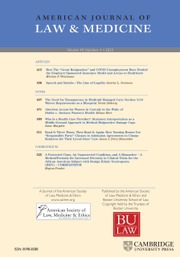Article contents
Recent Case Developments
Published online by Cambridge University Press: 06 January 2021
Abstract

- Type
- Notes and Comments
- Information
- Copyright
- Copyright © American Society of Law, Medicine and Ethics and Boston University 2015
References
1 Litigation involving Florida's Firearm Owners’ Privacy Act is often referred to as Docs v. Glocks. See, e.g., Manderscheid, Erika, Comment, Return Fire: An En Banc Hearing in Wollschlaeger v. Governor of Florida Is Necessary to Protect the First Amendment Rights of Physicians, 56 B.C. L. Rev. 123, 128 n.35 (2015)Google Scholar (citing Editorial, Doctor Gag Law Indefensible, St. Petersburg Times, Sept. 16, 2011, at A14).
2 Wollschlaeger v. Governor of Florida (Wollschlaeger II), 760 F.3d 1195 (11th Cir. 2014) opinion vacated and superseded on reh’g, Wollschlaeger v. Governor of Florida (Wollschlaeger III), 797 F.3d 859 (11th Cir. 2015).
3 See generally Complaint for Declaratory and Injunctive Relief, Wollschlaeger v. Farmer (Wollschlaeger I), 880 F. Supp. 2d 1251 (S.D. Fla. 2012) (1:11-cv-22026-MGC).
(1) A health care practitioner … may not intentionally enter any disclosed information concerning firearm ownership into the patient's medical record if the practitioner knows that such information is not relevant to the patient's medical care or safety, or the safety of others. (2) A health care practitioner … should refrain from making a written inquiry or asking questions concerning the ownership of a firearm or ammunition by the patient or by a family member of the patient, or the presence of a firearm in a private home or other domicile of the patient or a family member of the patient. Notwithstanding this provision, a health care practitioner or health care facility that in good faith believes that this information is relevant to the patient's medical care or safety, or the safety of others, may make such a verbal or written inquiry…. (5) A health care practitioner … may not discriminate against a patient based solely upon the patient's exercise of the constitutional right to own and possess firearms or ammunition. (6) A health care practitioner … should refrain from unnecessarily harassing a patient about firearm ownership during an examination…. (8) Violations of the provisions of subsections (1)-(4) constitute grounds for disciplinary action under ss. 456.072(2) and 395.1055.
Fla. Stat. § 790.338 (2015).
5 Complaint for Declaratory and Injunctive Relief, supra note 3, at 2.
6 Fred Hiers, Family and Pediatrician Tangle Over Gun Question, Ocala Star Banner (July 24, 2010), http://www.ocala.com/article/20100724/ARTICLES/7241001?p=all&tc=pgall [http://perma.cc/DVY9-SHG5].
7 Id. Dr. Chris Okonkwo also asks parents about pools in the summertime and asks drivers about driving while using their cellphone in order to provide safety advice.
8 See Wollschlaeger II, 760 F.3d at 1204 n.2. While the Act was debated in the state legislature, other incidents of doctors requesting gun ownership information or conditioning the receipt of care on a patient's willingness to answer were mentioned. The National Rifle Association also reported that some doctors were informing patients that they had to provide gun ownership information in order to receive Medicaid.
9 S.B. 432, 2011 Leg., Reg. Sess. (Fla. 2011); H.B. 155, 2011 Leg., Reg. Sess. (Fla. 2011); State of Fla., H.R. Final Bill Analysis, H.B. 155, at 2 (2011); Associated Press, Judge Blocks Florida Law, Allows Doctors to Ask About Guns, Ocala Star Banner (Sept. 14, 2011), http://www.ocala.com/article/20110914/ARTICLES/110919829?p=all&tc=pgall [http://perma.cc/L7E5-J5A6]; CS/CS/HB 155 – Privacy of Firearm Owners, FLA. H.R., http://www.myfloridahouse.gov/sections/Bills/billsdetail.aspx?BillId=44993 (tracking the history of H.B. 155 through the House of Representatives); CS/CS/CS/SB 432 – Privacy of Firearm Owners, Fla. H.R., http://www.myfloridahouse.gov/Sections/Bills/billsdetail.aspx?BillId=45055& (tracking the history of S.B. 432 through the Senate).
10 The original bill stated that: “a person who violates this section may be assessed a fine of not more than $5 million if the court determines that the person knew or reasonably should have known that the conduct was unlawful.” H.B. 155, at lines 48-50. The House Criminal Justice Subcommittee amended this section by defining exactly what fines would be attributed to a specific violation of the statute. State of Fla., H.R. Criminal Justice Subcomm. Staff Analysis, H.B. 155, at 1 (2011) (reporting that the first offense would be fined no less than $10,000, second offense no less than $25,000, and additional offenses no less than $100,000 if violation was knowing and willful).
11 CS/CS/HB 155 – Privacy of Firearm Owners, supra note 9. The final Act modified three Florida statutes. The Act amended the Florida's Patient's Bill of Rights and Responsibilities (Fla. Stat. § 381.026 (2015)), disciplinary structure for health care practitioners (Fla. Stat. § 456.072 (2015)), and created a statute for medical privacy concerning firearm ownership (Fla. Stat. § 790.338 (2015)).
12 See Complaint for Declaratory and Injunctive Relief, supra note 3, at 4. The original complaint was filed by three doctors and three Florida chapters of professional organizations including the American College of Physicians, the American Academy of Pediatrics, and the American Academy of Family Physicians. Id. The latter three plaintiffs represent 11,000 physicians.
13 Id.
14 Wollschlaeger I, 880 F. Supp. 2d 1251, 1262 (S.D. Fla. 2012).
15 See id. at 1266 (“In balancing the State's legitimate interests in regulating inquiries regarding firearm ownership and possession against the practitioners' free speech rights when communicating with patients in the practice of preventive medicine, I find that the inquiry restriction, record-keeping, anti-discrimination, and anti-harassment provisions cannot stand.”). The District Court particularly noted that the State did not have evidence to support the need for this regulation of speech. “The State provides little more than anecdotal information, however, to support its contention that individuals are suffering harassment and discrimination on the basis of firearm ownership. There is no evidence that such alleged harassment and discrimination is widespread or pervasive.” Id. at 1264.
16 See id.
17 Wollschlaeger II, 760 F.3d 1195 (11th Cir. 2014).
18 Id. at 2019.
19 Wollschlaeger III, 797 F.3d 859, 868 (11th Cir. 2015).
20 Id. at 888.
21 See id. at 891-94.
22 Id. at 892, 894 (“Indeed, one could make the case that when enacting laws governing the type of quintessential professional speech with which we are concerned here, the State has even more regulatory leeway than when regulating promotional speech by professionals, given the fiduciary context within which the former occurs.”).
23 Id. at 894.
24 Id. at 896 (citing Cent. Hudson Gas & Elec. Corp. v. Pub. Serv. Comm'n of New York, 447 U.S. 557, 556 (1980)).
25 See id. at 891.
26 See, e.g., King v. Governor of New Jersey, 767 F.3d 216, 235 (3d Cir. 2014); Stuart v. Camnitz, 774 F.3d 328, 248 (4th Cir. 2014); Pickup v. Brown, 740 F.3d 1208, 1227–28, 1231 (9th Cir. 2014).
27 Id. at 894 (“However, we need not determine conclusively whether a lesser form of scrutiny ever applies to regulations of professional speech, because in this case the outcome is the same whether a heightened intermediate scrutiny standard or some lesser level of judicial scrutiny is applied.”).
28 Appellant's Memorandum Addressing the Impact of Reed v. Town of Gilbert, Arizona at 13, Wollschlaeger III, 797 F.3d 859 (11th Cir. 2015) (No. 12-14009).
29 See generally Appellee's Submission Requested by the Court at 8, Wollschlaeger III, 797 F.3d 859 (No. 12-14009).
30 The American Bar Association (“ABA”) adopted a resolution “oppos[ing] governmental actions and policies that limit the rights of physicians and other health care providers to inquire of their patients whether they possess guns and how they are secured in the home.” A.B.A. H.Del. Res. 111 (Aug. 7, 2012). The ABA also filed a motion to file an amicus brief in support of Plaintiffs' petition for rehearing en banc. A.B.A's Motion for Leave to File Brief as Amicus Curiae in Support of Petition for Rehearing en banc of Petitioners-Appellees, Dr. Bernd Wollschlaeger, et al., Wollschlaeger III, 797 F.3d 859 (No. 12-14009). The ABA partnered with the American Academy of Family Physicians, American Academy of Pediatrics, American College of Emergency Physicians, American Congress of Obstetricians and Gynecologists, American College of Physicians, American College of Surgeons, American Psychiatric Association and the American Public Health Association in publically opposing “state and federal mandates that interfere with physician free speech and the patient-physician relationship, including laws that forbid physicians to discuss a patient's gun ownership.” Weinberger, Steven E. et al., Firearm-Related Injury and Death in the United States: A Call to Action From 8 Health Professional Organizations and the American Bar Association, 162 Annals of Internal Med. 513, 514 (2015).CrossRefGoogle Scholar
31 See, e.g., Mo. Rev. Stat. § 571.012 (2015) (prohibiting requirements that health care providers ask patients about firearm ownership or access); Mont. Code Ann. § 50-16-108 (2015) (prohibiting health care providers from asking about “ownership, possession or use of firearms as a condition of receiving health care.”); H.B. 2823, 84th Leg. (Tex. 2015) (prohibiting doctors other than a psychiatrist from asking a patient if there is a gun in the patient's home and from conditioning medical care on disclosure of such information); H.B. 2199, 85th Leg. (Kan. 2013) (passed after a deletion of the section prohibiting a physician other than a psychiatrist from asking a patient about guns in the home and from conditioning medical care on disclosure).
- 1
- Cited by


